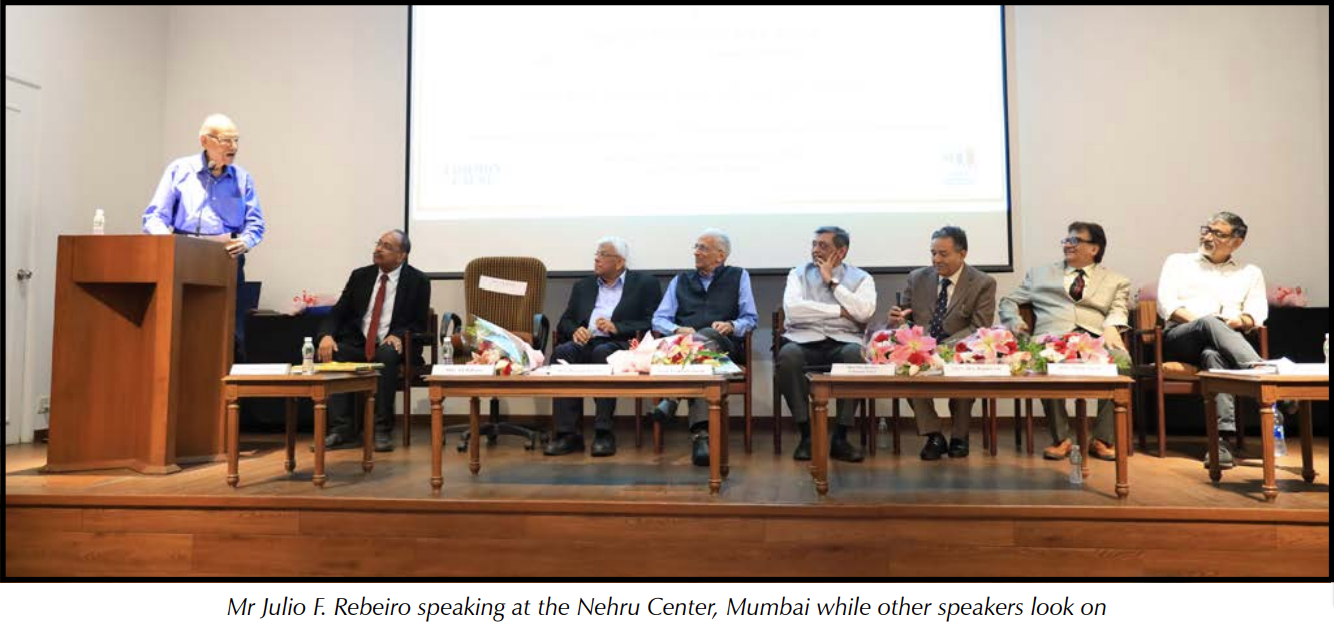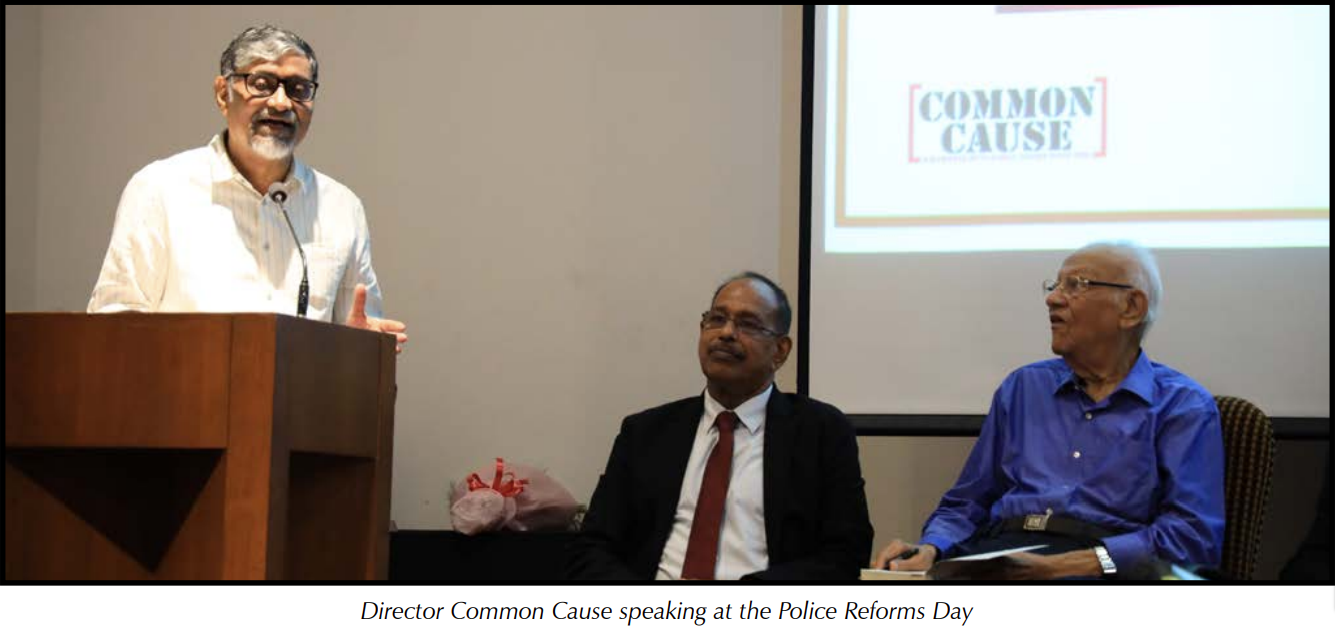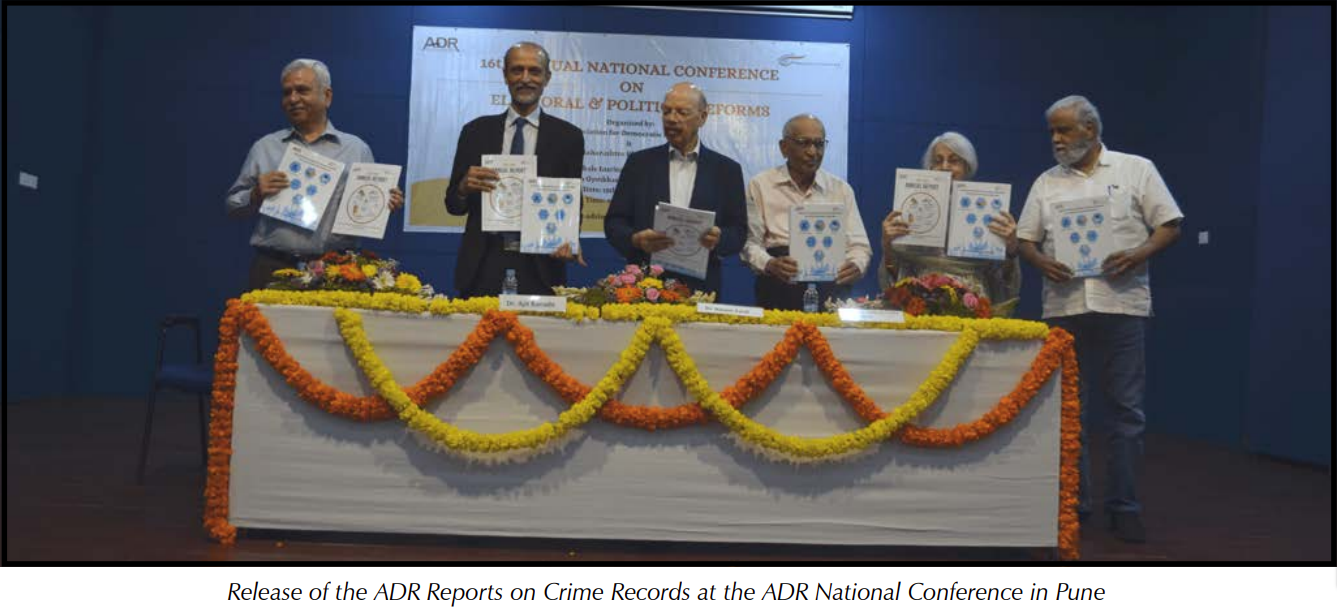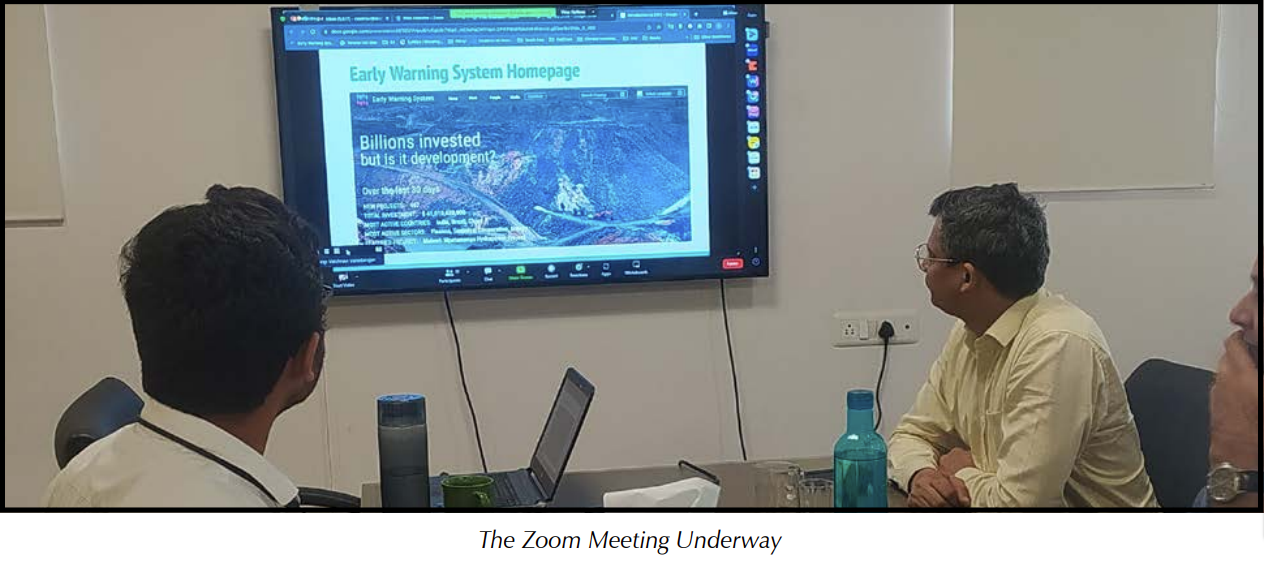Common Cause Events
Mohd. Aasif and Ashok Kumar*
Police Reforms Day, 2023 --- Mumbai, September 22, 2023

On September 22, 2023, Common Cause joined the Indian Police Foundation (IPF) and Public Concern for Governance Trust (PCGT) to observe the Police Reforms Day, 2023 at a well-attended function that was held at the Hall of Culture, Nehru Centre, Mumbai. Hon’ble Justice Gautam Shirish Patel, a Sitting Judge of the Bombay High Court, was the chief guest of the event which was attended by a large number of serving and retired police officers, media persons, lawyers, intellectuals and law students.
One of the highlights of the day was to confer a Lifetime Achievement Honour on a highly decorated former police officer Julio F. Ribeiro. Alumnus of 1953 IPS batch, Mr Ribeiro, 94, served as Mumbai Commissioner of Police and Director General of CRPF. At the height of the extremism in Punjab, he was given the charge of Director General of Police of the state and he later served as an advisor to the Governor of Punjab.
The main speakers of the day, besides Justice Gautam Shirish Patel and Mr Ribeiro, were Mr Prakash Singh, Patron IPF, Mr M L Kumawat, Acting Chairman IPF, Mr N Ramachandran, President IPF, Dr Vipul Mudgal, Director, Common Cause, and Mr Mihir Desai, Senior Advocate. The citation to honour Mr Rebeiro was read by leading industrialist and philanthropist Mr Deepak Parekh, former Chairman of HDFC.
Speaking on the relationship of Police and Politicians Mr Ribeiro candidly spoke in favour of operational independence of the force without undue interference of the political executive. “It means they should manage their own affairs and not look at the politicians to decide who should be appointed at the police stations and who should be arrested or not arrested”, he added.
Justice Patel underlined the significance of the rule of law in his keynote address. He cited the 2006

judgement of the Supreme Court in Prakash Singh & Ors v. Union of India regarding police reforms and called it a “missed opportunity” with a “narrow approach”. “Striving for an impartial and independent police force is a real struggle,” he added. Pointing to the impatient behaviour of the general public towards justice, he said, “there is no substitute for this system”. He also criticised the Bollywood movies that project police absurdly and added “films like Singham send very harmful message where a hero cop delivers justice single-handedly.”
Introducing the police reforms programme of Common Cause to the audience, Dr Mudgal explained the idea behind the Status of Policing in India Reports (SPIRs). He said the civil society is not looking for effective police alone but both effective and accountable police. “We want democratic and peoplecentric police whose balance is not tilted in favour of the rich and the powerful. Their real obligation, therefore, is not only to control crime and maintain peace but to do so while treating people with dignity and respect” he said.
16th National Conference on Of The Association for Democratic Reforms - Pune, July 15-16, 2023
The Association for Democratic Reforms (ADR) and the Maharashtra Election Watch (MEW) organised the 16th Annual National Conference at the Gokhale Institute of Politics and Economics (GIPE), Pune, on July 15 and 16, 2023. State Election Watch coordinators from all the states in India participated on the first day of the event, along with members from civil society groups, activists, journalists, retired bureaucrats, judges, advocates, political party representatives, academics and students.
Released at the event were the report on ‘Analysis of Sitting MLAs from 28 State Assemblies and 2 Union Territories of India 2023’ and the ADR’s Annual Report for FY 2022-23. The two-day event started with

a focus on the urgent requirement of addressing the most pressing problems in the electoral and political arena. The first day of the conference consisted of panel discussions on various important issues related to electoral and political reforms like ‘The Continuing Trend of Money Power and Criminality in Indian Politics: What is the way forward?’, ‘Decoding the Controversial Electoral Bonds Scheme: How long for Supreme Court to adjudicate?’, ‘Bringing Political Parties under RTI: Fostering inner-party democracy’, and ‘Local and Urban Governance’.
In his keynote address, the former Chief Election Commissioner, Dr Nasim Zaidi, talked about the necessity of clean politics, in view of the rise in criminal records of elected representatives from 22 percent to 43 percent. He also raised concerns about the impact of fake news, hate speech, divisive politics and the role of digital media in exacerbating these. Dr Zaidi lauded the efforts of ADR and National Election Watch (NEW) for their work on electoral and political reforms. He emphasised the need for a constitutional review of the first-past-the-post (FPTP) voting system.
Justice (Retd.) Narendra Chapalgaonkar, former Judge of Bombay High Court spoke on the challenges before Indian democracy and pointed out the role of religion and caste in electoral politics and their implications. Highlighting the issue of the election expenditure, he emphasised on the need for the declaration of wealth before and after elections.
Dr Vipul Mudgal, Director Common Cause and Trustee, ADR and NEW, participated in a panel discussion on decoding the controversial electoral bonds scheme. The discussion was chaired by Prof. Jagdeep Chhokar, founder member and trustee, ADR and NEW. The discussion was focused on institutional paralysis caused by electoral bonds and shed light on the judicial intervention and the continual acceptance of electoral bonds by opposing parties. Common Cause and ADR have challenged the constitutionality of the electoral bonds in a joint PIL. Dr Mudgal also chaired a panel discussion on “Bringing Political Parties under RTI: Fostering Inner-Party Democracy”. The discussion was focused on political parties’ refusal to come under the purview of RTI, absence of legal oversight or public scrutiny over the function of political parties, and transparency in ticket distribution, among other things.
India Justice Report by Citizens’ Forum India --- September 16, 2023
The Citizens’ Forum India organised a virtual discussion on India Justice Report (IJR) and invited two of its authors, Radhika Jha of Common Cause and Nayanika Singhal of India Justice Report to speak.
Ms Singhal explained the methodology adopted for the ranking system of the states for the four pillars of the Indian Justice System i.e. the police, judiciary, prisons and legal aid. Explaining the ranking system of IJR, she said that report looked into the representation of SC, ST, OBC and women, expenditure on training, disposal of cases, occupancy of prisons with undertrials and convicts; and accessing justice through the State Human Rights Commissions among other things. While talking about a few findings, she pointed out that money equivalent to six veg burgers is spent annually on legal aid per person.
Ms Radhika Jha elaborated on the role of the police, one of the four pillars of the justice system. She spoke about the expenditure on police training, filling of vacancies, police diversity and other indicators used in the report. “Every state has statutorily mandated quotas for SC, ST and OBC in the police but only Karnataka has been able to fulfil these reserved quotas”, she added. Responding to one of the queries on pending cases in the courts, she said, vacancies of the judges and magistrates is one of the major reasons for the pendency of cases.
Meeting with Mineral Inheritors Rights Association (MIRA) --- August 28, 2023
Common Cause team participated in a meeting of the Mineral Inheritors Rights Association (MIRA) on August 28, 2023. The meeting started with a session where various stakeholders from the mining-affected regions raised issues they were facing and MIRA members provided suggestions to deal with their issues. Following this, Vaishnavi Varadarajan of International Accountability Project (IAP) delivered a talk on the Early Warning System (EWS). The EWS is an initiative that ensures local communities and the organisations that support them, to have verified information about projects being proposed at major development finance institutions.
The Early Warning System includes the first web-based tool to organise, summarise and standardise

projects at 13 development finance institutions. The growing database is updated daily and holds more than 7,000 projects proposed since 2016. While the database itself is an important resource, the EWS team also focuses on outreach for getting this information and extending support to those affected by the proposed project who needed it the most.
Lecture on Indian Legal System and Access to Justice --- August 29, 2023
Radhika Jha, Lead (Rule of Law) at Common Cause was invited to deliver a guest lecture to the law students from the National Law School of India University (NLSIU), Bangalore on Police violence and discrimination in India on August 29, 2023. The lecture focused on findings of the SPIR series that highlighted the systemic biases within the police in India. Simultaneously, the students were introduced to survey methodology as a research tool for studying the Indian criminal justice system. It was part of an elective course titled ‘Indian Legal System and Access to Justice’.
Release of SafetyNiti 2023 --- August 11, 2023
Safe in India, an organisation working towards the safety of workers at automobile factories, released its annual report ‘SafetyNiti 2023, three years of tracking India’s top 10 auto sector brands’ OSH Policies for their supply chain: Gaps, Opportunities, Best Practices, Solutions,’ on August 11, 2023.
Common Cause team attended the virtual panel discussion on the topic ‘Will ESG reporting deliver supply chain sustainability in the auto sector supply chain? Does it measure and report on the real changes on the ground that must follow an improvement in policies on paper?’. Dr Garima Dadhich, Associate Professor, Indian Institute of Corporate Affairs; Mr. Gorakh G Velapurkar, VP (Materials), Bajaj Auto; and Dr Dev Nathan, Professor, Institute for Human Development were on the panel discussion. Sandeep Sachdeva, Co-Founder and CEO, Safe in India moderated the event.
During the event, one of the injured workers associated with Safe in India, Ram Singh Parihar, expressed dismay over the sloppy approach towards the safety. He said, “There is no timely maintenance of machines in our factory. Neither the maintenance staff is available on time. They don’t carry out maintenance task even when we inform that the machine is out of order.”
The findings of the latest report show that there has been a slow but steady improvement in the brands’ occupational safety and health policies since SafetyNiti 2021, with Bajaj and Honda having improved the most on several parameters, while TVS and Ashok Leyland continue to remain at the bottom. As an impact of the past reports, eight of the top 10 auto sector companies have now declared their OSH policies in the public domain, four auto sector companies have their Human Rights policy in the public domain and categorically cover non-permanent workers and/or deeper supply chain and six of them now have Supplier Code of Conduct in the public domain.
NEXT »



